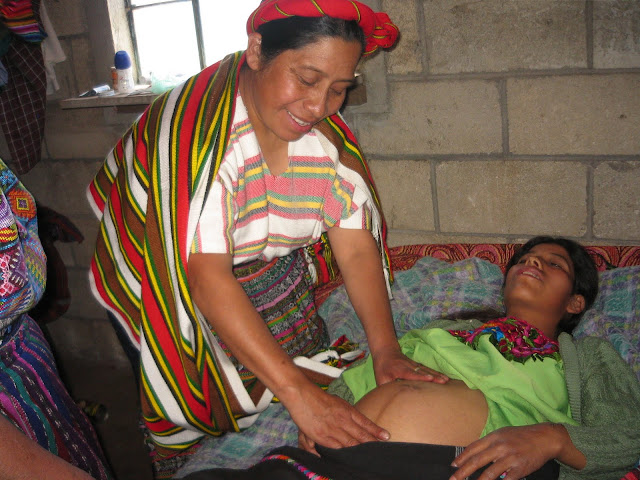Our schedule was filled with learning, sharing, experiencing the culture and lives of our sisters in Guatemala. We worked for 4 days in the rural Mayan villages of Chuicutama and Pacutama about an 1 1/2 hours outside of Quetzaltenango
The trip included
•Participating in midwifery and health promoter trainings – with a focus on prenatal care, fetal position, traditional birth, post-partum care. The health promoters learned about vital signs, blood pressure and thermometers
•Participating in a local health committee meeting to explore development of VCU collaboration to improve health access and services in the 5-7 area villages.
•Communal lunches with our Mayan women hosts
•lessons from midwives on medicinal herbs
•Sharing in laughter and fun via therapeutic clowning - bubbles and colorful outfits
•sweat baths in a ‘Temascal’ a sacred Mayan tradition
•Lecture from a ‘bone-setter’, similar to an orthopedic surgeon
•Lecture from a Mayan spiritual guide and participation in a sacred Mayan ceremony
•A Mayan Cosmovision lecture on history and culture with Daniel Matul: with a focus on Mayan conception of health and current Mayan health conditions and practices with trends and issues in Mayan Women’s Health Care
•Presentation on the Health situation in Guatemala from Yolanda Castile a government public health nurse and district manager.
•Meeting with ACAM – Maternity Center in Concepcion Chiquirichapa, Guatemala
•Stop at Iximché(“E-ch-em-shay”)the Pre-Colombian capitol of the Kakchiquel Maya kingdom from 1470 until its abandonment in 1524.
•Salsa lessons in Antiqua
Two of the VCU School of Social Work students utilized the trip to receive independent study credit as they studied issues related to women’s health, maternal mortality, family life and social justice in rural Guatemala under the faculty guidance of Karen Smith Rotabi, PhD, Assistant Professor Virginia Commonwealth University School of Social Work.
The group also used an article by Rotabi: “Ethical Guidelines for Study Abroad’ to critically analyze the teams approach to the service/exchange experience. Using the pillars for ethical study model the group considered issues of power and privilege, community capacity, competence, integrity, dependency, and self-determination to facilitate a safe yet challenging learning environment with a social justice and human rights framework.
Overall it was an amazing trip - transformative as the folks at Highland Support Project like to define things. The midwives were very happy to receive the kits we had prepared and were particularly thrilled with the scissors. So many of our family and friends contributed to this effort with donations of cash and supplies. The midwives shared that they often didn't have the right tools to assist in births and though amazingly creative and innovative using a machete for cutting the umbilical cord would not be something we wanted them to have to continue. We learned so much from the women we spent time with and we were incredibility inspired by their courage, tenacity and eagerness to lovingly support the health of their communities and the miracle of birth in their villages.
Wednesday, July 14, 2010
Subscribe to:
Post Comments (Atom)


No comments:
Post a Comment